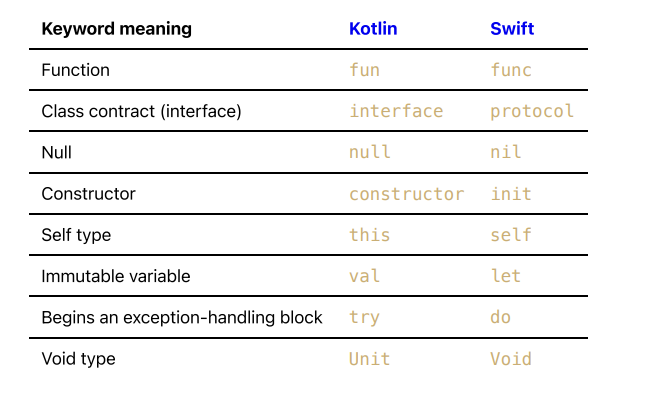According to the latest stackoverflow survey Swift and Kotlin are among the most-loved programming languages. Both are becoming more and more popular and have almost completely replaced the venerable Java and Objective C in the world of mobile platforms. It’s not a surprise, as the giants of the IT industry such as Apple, JetBrains and Google are involved in their development. If you are an Android or iOS developer, you likely know at least one of these languages.
This article summarizes the most significant syntax differences between the languages. Knowing them allows you to switch to a second language and become a Swifter if you are a Kotliner, and vice versa. The article will not, however, explain differences in memory management or between iOS and Android platforms.
At the time of writing, Swift is in version 5.7 and Kotlin version is 1.7.20.
Some code snippets are incomplete or lack input validation for the sake of simplicity.
Ok, lets get started.
Keywords
The majority of the keywords are interchangeable and have the same meaning. For example, 'if', 'else', 'for', 'while', and 'continue' statements work in the same way as they do in other C-like languages.
Part of the reason for keyword differences is that the applications written in the languages use different memory models. Swift keywords like 'weak' and 'unowned' aid in resolving retain cycles, which Kotlin programmes do not have.

Access level (visiblity modifiers)
Both languages support access levels such as 'public,' 'internal,' and 'private.' The underlying meaning is the same. Swift supports the 'fileprivate' access level but not the 'protected' access level.
 Functions
Functions
Kotlin functions are declared using the ‘fun’ keyword whereas Swift functions are declared using the ‘func’ keyword. To declare a return type, Kotlin uses colon (:) notation, Swift arrow (->).
fun compute(): Double //Kotlin
func compute() -> Double //Swift
If a function does not return any value, the return notation along with the type declaration can be omitted. Both languages support named arguments and default arguments values.
1 2 3 4 5 6 7 8//Kotlin fun export(sourceFileName: String = "input.txt", destinationFileName: String = "output.xlsx") { //returns nothing (Unit) //... } export(sourceFileName = "in.txt", destinationFileName = "out.xlsx") export("in.txt", "out.xlsx")
Labels make using functions in Swift more natural.
1 2 3 4 5 6 7//Swift func export(from sourceFileName: String = "input.txt", to destinationFileName: String = "output.xlsx") { //returns nothing (Void) //... } export(from: "in.txt", to: "out.xlsx")//obligatory argument labels `from`, 'to' export()
If you don’t want an argument label for a parameter, type an underscore '_' instead of an explicit argument label for that parameter.
1 2 3 4func printString(_ str: String = "bar") { print(str) } printString("hello")
Static methods
In Kotlin class methods are created inside the 'companion object' block. There is no the 'static' keyword in Kotlin.
1 2 3 4 5 6 7 8 9 10class Json { //elements declared inside companion object block are class methods companion object { fun parse(jsonCandidate: String): Json { //... return json } } } val json = Json.parse("...")
Swift takes a bit more conservative approach. The 'static' and 'class' keywords are used to utilize class functionality without creating an instance. Subclasses can override 'class' methods but they can not override 'static' methods.
1 2 3 4 5 6 7 8 9 10 11 12 13class Json { static func parse1(_ jsonCandidate: String) -> Json { ///... return json } class func parse2(_ jsonCandidate: String) -> Json { ///... return json } } let json1 = Json.parse1("...") let json2 = Json.parse2("...")
Static variables
In Kotlin, a class variable, just like a class function, has to be declared inside 'companion object' block.
1 2 3 4 5 6//kotlin class Counter { companion object { var globalCounter: Int = 0 } }
To declare a class variable in Swift, declare it as a normal variable, prefixed with the 'static' keyword.
1 2 3 4//swift struct Counter { static var globalCounter: Int = 0 }
Parentheses
Usage of parentheses for contional statements, loops, 'guard', 'switch' is not required in Swift language. In Swift, parentheses are considered redundant, causing unnecessary syntactic noise. Linters (such as SwiftLint) will warn you if you include redundant parentheses.
1 2 3 4//Kotlin if (a > b) { //Parentheses obligatory print("$a is grater than $b") }
1 2 3 4//Swift if a > b { //Parentheses omitted print("\(a) is greater than \(b)") }
Inline if
There is no ternary operator in Kotlin. Really. Fortunately, 'if' is an expression: it returns a value. Hence, the way Kotlin declares an inline if is also expressive
val res = if (a>b) a else b
Swift supports ternary operator like most languages do.
let res = a>b ? a : b
String interpolation
In Kotlin, use the dollar sign ($) before a variable name to interpolate a value of this variable into a string.
1 2 3val name = "Joe" println("Hello, $name") println("Your name is ${name.length} characters long")
In Swift wrap the variable in a pair of parentheses, prefixed by a backslash.
1 2 3let name = "Joe" print("Hello, \(name)") print("Your name is \(name.count) characters long")
Mutability
In Kotlin, mutability means that a 'var' variable can be reassigned with another value. Variables declared with the 'val' keyword are immutable and can not be reassigned.
1 2 3 4 5var a = 1 a = 2 //`var` variable can be reassigned val b = 1 //b = 2, doesn't compile, `val` variable can not be reassigned
In Kotlin, if a class variable is declared with the 'var' keyword, we can reassign it, even if an instance of the class is declared immutable.
1 2 3 4 5data class User(val name: String, //immutable `val` var email: String)//mutable `var` val user = User("John Doe", "john.doe@gmail.com") //immutable user variable user.email = "john.doe@hotmail.com" //mutable user.email variable
Kotlin distinguishes mutable and immutable collection classes. Mutable collections allow adding and removing items, immutable collections are fixed-size.
1 2 3 4 5 6 7 8val mutableNumbers: MutableList<Int> = mutableListOf(1,2,3) mutableNumbers.removeAt(0) mutableNumbers.add(0, 1) var immutableNumbers: List<Int> = listOf(1,2,3) //immutableNumbers.removeAt(0) //doesn't compile, method unavailable //immutableNumbers.add(0, 1) //doesn't compile, method unavailable immutableNumbers = mutableNumbers //`var` can be reassigned
In Swift, an immutable variable cannot be reassigned, and the variable value can not be changed.
Declare mutable variables with the 'var' keyword and immutable with the 'let' keyword.
1 2 3 4 5 6 7 8 9 10 11 12 13 14 15 16 17 18 19 20 21 22 23 24 25var a = 1 a = 2 let b = 1 //b = 2, doesn't compile - cannot assign to value: 'b' is a 'let' constant struct User { let name: String //immutable `let` var email: String //mutable `var` } let letUser = User(name: "John Doe", email: "john.doe@gmail.com") //letUser.email = "john.doe@hotmail.com" //doesn't compile - cannot assign to property: 'user' is a 'let' constant var varUser = User(name: "John Doe", email: "john.doe@gmail.com") varUser.email = "john.doe@hotmail.com" var mutableNumbers: [Int] = [1,2,3] mutableNumbers.remove(at: 0) mutableNumbers.insert(1, at: 0) let immutableNumbers: [Int] = [1,2,3] //immutableNumbers.remove(at: 0) // doesn't compile - cannot use mutating member on immutable value: 'immutableNumbers' is a 'let' constant //immutableNumbers.insert(1, at: 0) // doesn't compile - cannot use mutating member on immutable value: 'immutableNumbers' is a 'let' constant
Loops
Both languages support 'for' and 'while' loops. The 'do' keyword in Swift is reserved for beginning of an exception-handling block, so the following loop construct:
do { } while condition //not supported in Swift
is not supported in Swift, but you can use the `repeat` instead:
repeat { } while condition //supported in Swift
1 2 3 4 5 6 7 8 9 10 11 12 13 14 15 16 17 18 19 20 21for (i in 0..2) { println(i) //0, 1, 2 } var i = 0 do { println(i)//0, 1 i += 1 } while (i<2) repeat(2) { println(it)//0, 1 } for (i in 0..4 step 2) { println(i)//0, 2, 4 } for (i in 4 downTo 0 step 2) { println(i)//4, 2, 0 }
1 2 3 4 5 6 7 8 9 10 11 12 13 14 15 16 17 18 19 20 21for i in 0...2 { print(i) //0, 1, 2 } var i = 0 repeat { print("i: \(i)") i += 1 } while i<2 for i in stride(from: 0, to: 4, by: 2) { print(i)//0, 2 } for i in stride(from: 0, through: 4, by: 2) { print(i)//0, 2, 4 } for i in stride(from: 2, through: 0, by: -0.5) { print(i)//2.0, 1.5, 1.0, 0.5, 0.0 }
Error handling
In Kotlin, errors are represented by instances of classes that extends the 'Throwable' class. Kotlin does not have checked exceptions, functions are not denoted with the 'throws' keyword. The well known 'try/catch/finally' block is the way to handle exceptions.
1 2 3 4 5 6 7 8 9 10 11 12 13 14 15 16 17 18 19 20 21sealed class DomainError: Exception() data class NoSuchProduct(val id: Int): DomainError() object TooManyItems: DomainError() fun sendOrder() { //... throw TooManyItems() //... } try { sendOrder() } catch (err: NoSuchProduct) { print("Product with id ${err.id} not found") } catch (err: DomainError) { print("Domain error: $err") } catch (err: Throwable) { print("Unknown error: $err") } finally { //clean up section }
In Swift, errors are represented by values of types that conform to the Error protocol. If a function calls other throwing function, the calling function has to catch an error or rethrow it. Throwing functions are marked with the 'throws' keyword. Swift does not have the 'finally' block. You can run cleanup actions using the defer statement.
1 2 3 4 5 6 7 8 9 10 11 12 13 14 15 16 17 18 19 20enum DomainError: Error { case NoSuchProduct(id: Int) case TooManyItems } func sendOrder() throws { //throwing method ... throw DomainError.TooManyItems //... } do { try sendOrder() } catch DomainError.NoSuchProduct(let id) { print("Product with id: \(id) not found") } catch let err as DomainError { print("Domain error: \(err)") } catch { print("Unknown error: \(error)") }
Flow control with 'switch' statement
Kotlin does not have the traditional 'switch-case' statement. Kotlin has the 'when' statement.
1 2 3 4 5 6 7 8 9 10 11 12 13 14 15 16 17 18 19 20 21 22 23 24 25 26 27 28 29 30sealed interface Error {} sealed class NetworkError: Error { object NoData: NetworkError() data class HttpStatusNok(val statusCode: Int): NetworkError() } enum class ParseError(val code: Int): Error { UnknownParseError(10), BadFormat(20), MissingClosingTag(30) } //`when` with object matching val result: Error = NetworkError.HttpStatusNok(statusCode = 500) when (result) { is NetworkError.NoData -> println("No data") is NetworkError.HttpStatusNok -> println("Status not ok: ${result.statusCode}") ParseError.MissingClosingTag -> println("Missing closing tag") is ParseError -> println("Parse error") } //`when` with numbers when (1.1) { 0.0 -> println("0.0") 1.1 -> println("1.1") in 2.0..9.0 -> { println("Between 2.0 and 9.0") } else -> println("Other") }
Swift’s switch statement is more powerful than its counterpart in many C-like languages.
1 2 3 4 5 6 7 8 9 10 11 12 13 14 15 16 17 18 19 20 21 22 23 24 25 26 27 28 29 30 31 32 33 34 35 36 37 38enum NetworkError: Error { case noData case httpStatusNok(statusCode: Int) } enum ParseError: Int, Error { case unknown = 10 case badFormat = 20 } //`switch` with object matching let error: Error = NetworkError.httpStatusNok(statusCode: 500) switch error { case NetworkError.httpStatusNok(statusCode: 500): print("Internal server error 500") case NetworkError.httpStatusNok(statusCode: let statusCode): print("Server error, status code: \(statusCode)") case is NetworkError: print("Network error") case let e as ParseError where e.rawValue == 20: print("Parse error bad format, code: \(e.rawValue)") case let e as ParseError: print("Parse error, code: \(e.rawValue)") default: print("Other error") } //`switch` with numbers switch 1.1 { case 0: print("Zero") case 1.1: print("1.1") case 2...9: print("Between 2 and 9") default: print("Other") }
Null safety
Both languages support nullable types AKA optionals. Declaration of an optional variable is identical for Kotlin and Swift.
var str: String? = null //Kotlin
1var str: String? = nil //Swift
However, there are minor differences for using optionals. Check the examples below to understand how to use optionals in the languages.
Forced optional unwrapping
1 2val name: String? = "Kotlin" print(name!!) //double !!
1 2let name: String? = "Swift" print(name!) //single !
Null/nil fallback
Kotlin has the ??: operator, known as Elvis operator.
1 2 3 4 5fun findString(): String? fun defaultString(): String val nonNilString1: String = findString() ?: defaultString() val nonNilString2: String = findString() ?: throw RuntimeException("String not found")
Swift has ?? nil coalescing operator.
1let nonNilString: String = findString() ?? defaultString()
Unwrapping with conditions
Kotlin has a cool feature called smart cast. When an immutable optional is verified as non null, it becomes a non nullable variable.
1 2 3 4 5 6 7 8 9 10 11 12 13val str: String? = ... if (str != null) { val strLen: Int = str.length //Smart cast in action: str is not null here println(strLen) } str?.let { print(it) //implicit 'it' variable holds a non null value } str?.let { nonNullStr -> print(nonNullStr) //explicit `nonNullStr` variable holds non null value }
Swift:
1 2 3 4 5 6 7 8 9 10 11//swift var str: String? = ... if let nonNullStr = str { //`nonNullStr` variable holds a non nil value print(nonNullStr) } if let str = str { let strLen: Int = str.count //str is not null here print(strLen) }
Checking pre-conditions with guard clauses
Both languages offer one-liner statements used to validate input against null variables.
In Kotlin, use Elvis operator.
1 2val str: String? = findString() val nonNullStr = str ?: return
In Swift, guard statement is used to transfer program control out of a scope if one or more conditions aren’t met.
1 2let str: String? = findString() guard let nonNilStr = str else { return }
Lambdas
Both languages support higher-order functions and lambda statements. There are minor differences between the languages especially in naming implicit variables. Let's look into the examples.
1 2 3 4 5 6 7 8 9 10 11 12 13fun sum(integers: List<Int>, transformation: (Int)->Int): Int { var result = 0 integers.forEach { //implicit 'it' variable holds current value result += transformation(it) } return result } val multiplyBy2: (Int)->Int = { arg -> arg*2 } //explicit variable named arg val multiplyBy3: (Int)->Int = { it * 3 } //implicit variable 'it' val result1 = sum(listOf(1,2,3), multiplyBy2) val result2 = sum(listOf(1,2,3)) { //trailing closure it * 2 }
1 2 3 4 5 6 7 8 9 10 11 12 13func sum(_ integers: [Int], _ transformation: (Int)->Int)-> Int { var result = 0 integers.forEach { //implicit '$0' variable holds current value result += transformation($0) } return result } let multiplyBy2: (Int)->Int = { arg in arg*2 } //explicit variable named arg let multiplyBy3: (Int)->Int = { $0 * 3 } let result1 = sum([1,2,3], multiplyBy2) let result2 = sum([1,2,3]) { //trailing closure $0 * 2 //implicit first arg '$0' }
Ranges
Kotlin has closed ranges:
1val range = 0..3 //contains values: 0, 1, 2, 3
Ranges in Swift are more advanced:
1 2 3 4 5 6 7 8 9//Swift supports closed ranges let closedRange = 0...3 //contains values: 0, 1, 2, 3 //half-open ranges let halfOpenRange = 0..<3 //contains values: 0, 1, 2 //one-sided ranges let oneSidedRange1 = ..<3 //contains values: from -∞ to 2 let oneSidedRange2 = 2... //contains values: 2 to ∞
This is everything for now, but in the second part of the article we will take a closer look at the differences between abstractions, classes and inheritance. I hope you find the article useful and will come back for part two!



